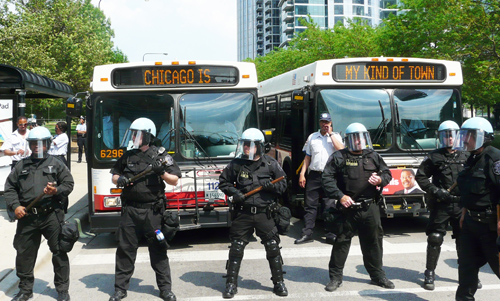MEDIA WATCH: Shades of how Chicago officials slanted news coverage during Rahm's NATO hype and all the way back to the Vietnam War... Reporters threatened, arrested trying to cover Ferguson stories
"Good" reporters in the eyes of government officials and private crooks are the ones who sit pertly in a room waiting for government officials (and sometimes private crooks like charter school operators) to serve up the story. The infamous "Five O'Clock Follies" in Vietnam were just one of the most memorable examples. The "Five O'Clock Follies" were the daily press briefings held in the American compound in Saigon to tell the world's new organizations what was going on across the country with the war.
 Militarized police in Chicago during the NATO meeting in May 2012 attacked reporters who did not adhere to the "no reporting zones" that city officials had established by herding journalists around in buses -- and steering them away from the scenes of confrontations where police attacked protesters. Substance photo by Kati Gilson.Until the mid-1960s, most American news organizations actually went along with this propaganda program. Then a growing number of young reporters went out into the war to get the stories of the war where it was being fought, and the President of the United States began demanding that certain news organizations withdraw their rude reporters from the Vietnam beat.
Militarized police in Chicago during the NATO meeting in May 2012 attacked reporters who did not adhere to the "no reporting zones" that city officials had established by herding journalists around in buses -- and steering them away from the scenes of confrontations where police attacked protesters. Substance photo by Kati Gilson.Until the mid-1960s, most American news organizations actually went along with this propaganda program. Then a growing number of young reporters went out into the war to get the stories of the war where it was being fought, and the President of the United States began demanding that certain news organizations withdraw their rude reporters from the Vietnam beat.
That was then, this is now.
Since the beginning of the protests in Ferguson Missouri, reporters have been reporting that the local police have been trying to stop them from covering the stories that have been unfolding every day and night. By the morning of August 18, 2014, the oppression against reporters had grown so massive that even the Washington Post was reporting the facts:
Police target journalists in Ferguson
Updates by Washington Post August 18, 2014)
Since chaos erupted in the streets of Ferguson, Mo., more than a week ago, journalists from all over the world have flocked to the scene. They have also, increasingly, become the target of police arrests.
Overnight, several journalists reported being detained, threatened or otherwise prevented from covering the unfolding story. The arrest late Sunday night of three reporters � Robert Klemko of Sports Illustrated, Chicago-based Financial Times reporter Neil Munshi and Rob Crilly, a foreign correspondent for the Telegraph (and no stranger to war zones) � reportedly came as the journalists attempted to gather more information while police faced off with protesters.
They were ordered arrested by Missouri Highway Patrol Capt. Ron Johnson, who has been serving as a critical bridge between the Ferguson community and law enforcement.
The journalists said that they were released shortly after their arrests, but not before plastic �handcuffs� were put around their wrists.
Threats, tear gas and even arrest have become occupational hazards for reporters in Ferguson. Some journalists have been seen wearing bulletproof vests and gas masks, as the risk of injury by real bullets, rubber bullets and tear gas is high.
In many cases, journalists eager to get the story have run into agitated cops worried by the threat of molotov cocktails, rocks, gunfire and general chaos.
Late Sunday night, a volunteer radio reporter operating a popular video livestream of events in Ferguson was threatened by an unnamed police officer.
�Get the f� out of here and keep that light off or you�re getting shelled with this,� the officer appeared to yell. Several other reporters also appeared to be the in the area, and the tense exchange was broadcast to thousands through the Argus Radio livestream channel.
Despite repeatedly identifying himself as a member of the media, Mustafa Hussein found himself threatened with a gun for having the keylight on his camera on.
MSNBC host Chris Hayes tweeted that police threatened to spray him with mace if he didn�t �get back.�
All this comes after two reporters were arrested inside a McDonald�s last week during largely peaceful protests in Ferguson. One of those journalists, The Washington Post�s Wesley Lowery, recorded the exchange with policewho said they were clearing the restaurant where Lowery and the Huffington Post�s Ryan Reilly were working.
According to Lowery, police slammed him into a soda machine, then arrested him after giving him conflicting direction about where to exit the McDonald�s.

